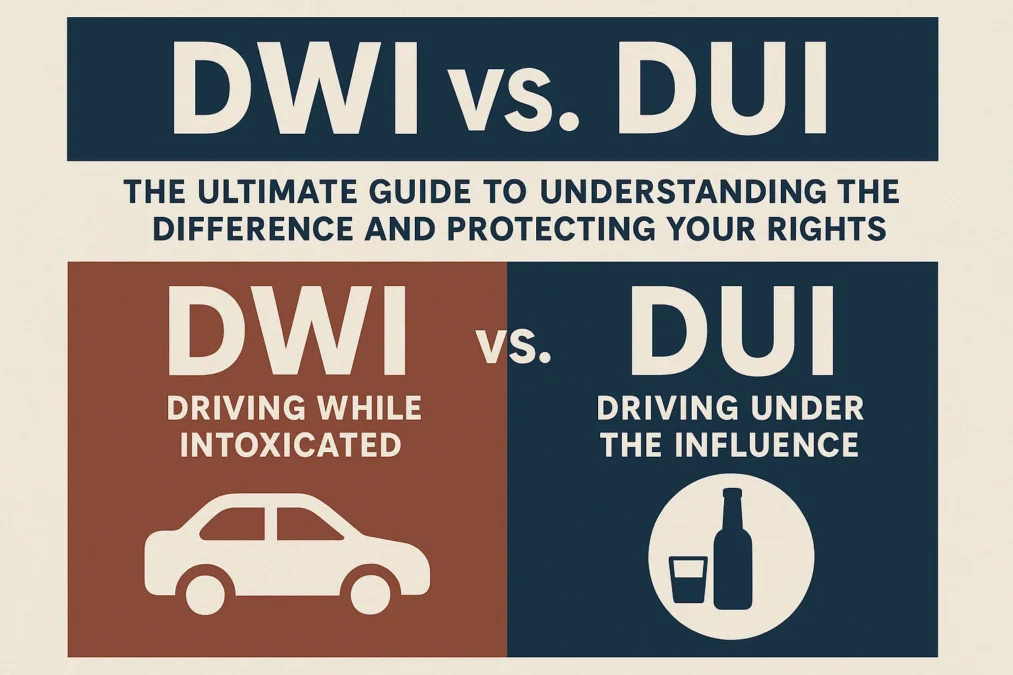DWI vs DUI: You see the flashing red and blue lights in your rearview mirror, and your heart sinks. After pulling you over, the officer suspects you’ve been drinking and asks you to step out of the car. The next thing you know, you’re being charged with a serious offense. But is it a DWI or a DUI? For many people, these two acronyms are a source of major confusion. They are often used interchangeably in casual conversation, leading to the widespread belief that they are the same thing. This misconception can be a critical mistake when you’re facing charges.
Understanding the precise legal meaning behind these terms is not just an exercise in semantics; it’s a crucial step in grasping the severity of your situation, the potential penalties you face, and the defense strategies that might be available to you. The difference between a DWI and a DUI can have a profound impact on your finances, your driving privileges, your criminal record, and even your personal freedom. This comprehensive guide will demystify these terms, exploring their definitions, the consequences they carry, and the intricate legal landscape that varies from state to state. Our goal is to provide you with the knowledge you need to make informed decisions if you ever find yourself in this difficult position.
What Does DUI Actually Stand For?
Let’s start by breaking down the acronym. DUI stands for “Driving Under the Influence.” This is a broad term that primarily refers to operating a motor vehicle while under the influence of alcohol. However, its scope is often much wider. In many jurisdictions, the “influence” part of a DUI charge isn’t limited to just alcohol. It can also encompass impairment due to illegal drugs, prescription medications, or even over-the-counter remedies that can affect your ability to drive safely. The core legal principle of a DUI charge is impairment. The prosecution must prove that your mental or physical faculties were so compromised by a substance that you could not operate a vehicle with the caution of a sober, reasonable person.
The methods used to establish this impairment vary. Often, it begins with field sobriety tests, such as the walk-and-turn or the one-leg stand. Law enforcement officers are trained to look for specific clues of impairment during these tests. While chemical tests like breath, blood, or urine analysis provide more concrete evidence of substance levels, a DUI charge can sometimes be sustained even without a high blood alcohol concentration (BAC) if the officer’s testimony and other evidence strongly suggest you were impaired. This makes DUI a somewhat flexible charge that focuses on your actual driving behavior and observable condition.
What Does DWI Actually Mean?
On the other side of the coin is DWI, which stands for “Driving While Intoxicated” or, in some states, “Driving While Impaired.” This term often carries a more specific and technically severe connotation than DUI. In states that distinguish between the two, a DWI charge is typically reserved for cases involving a high level of alcohol, specifically when a driver’s Blood Alcohol Concentration (BAC) meets or exceeds the legal limit of 0.08 percent. While a DUI is about general impairment, a DWI is frequently treated as a per se offense, meaning you can be convicted based solely on your BAC level, regardless of whether you appeared outwardly impaired or drove erratically.
The key distinction here is the objective measurement. A DWI accusation often relies heavily on the hard number provided by a breathalyzer or blood test. Because it is based on a measurable threshold, it can sometimes be easier for prosecutors to prove than a DUI based purely on subjective signs of impairment. This is why in states that use both terms, a DWI is often considered the more serious charge. It implies a specific, quantifiable level of intoxication that the law has deemed unacceptable and particularly dangerous. However, it is absolutely critical to remember that this logic is not universal, and the hierarchy of severity completely depends on the specific laws of the state where the offense occurs.
The Critical Role of State Laws in Defining DWI and DUI
This is perhaps the most important takeaway: there is no single, nationwide standard for what constitutes a DWI versus a DUI. The United States has a decentralized legal system, and traffic laws, including those governing impaired driving, are primarily determined at the state level. This means that the definitions, penalties, and very usage of these terms change as you cross state lines. Trying to apply the logic of one state’s laws to another can lead to disastrous misunderstandings about the nature of the charges you are facing.
In some states, the distinction is clear and significant. For example, one state might use DWI for alcohol-related offenses with a high BAC and DUI for cases involving drugs or a lower level of alcohol impairment. In other states, the two terms might be used interchangeably in the legal statute, with no practical difference between them. And in a large number of states, only one term is used officially in the legal code. For instance, some states exclusively use the term OWI (Operating While Intoxicated) or OVI (Operating a Vehicle Impaired). This patchwork of laws makes it absolutely essential to consult with a local attorney who understands the specific nuances of your state’s impaired driving statutes.
How Different States Classify These Offenses
To illustrate this state-by-state variation, let’s look at a few examples. In a state like Texas, the legal system makes a clear distinction. DWI is the standard charge for driving with a BAC of 0.08 or higher, while DUI is a separate, typically less severe charge reserved exclusively for minors under the age of 21 who have any detectable amount of alcohol in their system. In this case, the DUI for a minor is a “zero-tolerance” law. Conversely, in a state like Colorado, the legal code does not even contain the term “DWI”; it exclusively uses “DUI” for all charges related to driving under the influence of alcohol or drugs.
Then you have states like New York, which uses DWI for alcohol-related offenses but uses the term DWAI (Driving While Ability Impaired) for cases involving drugs or a lower level of alcohol impairment that still affects driving. Maryland uses both DWI and DUI, but interestingly, a DWI there is often considered the more severe charge, as it requires a higher BAC level. This reverse of the expected hierarchy perfectly demonstrates why you cannot make assumptions. Your defense strategy and the potential outcome of your case hinge entirely on understanding these local legal intricacies.
Comparing DWI and DUI Side-by-Side
While the specific legal definitions vary, we can create a general comparison based on how states that differentiate between the two terms typically apply them. This table provides a high-level overview of the common distinctions, but it must be reiterated that this is a generalization and not a substitute for state-specific legal advice.
| Feature | DWI (Driving While Intoxicated) | DUI (Driving Under the Influence) |
|---|---|---|
| Primary Focus | High Blood Alcohol Concentration (BAC), typically 0.08% or higher. | General impairment of mental or physical faculties. |
| Common Substance | Primarily alcohol. | Alcohol, illegal drugs, prescription medications, over-the-counter drugs. |
| Basis of Charge | Often a per se offense based on a measurable BAC level. | Based on observable impairment and supporting evidence. |
| Typical Severity | Often considered the more serious charge in states that distinguish. | Often considered a lesser charge in states that distinguish. |
| Common Penalties | Heavier fines, longer license suspension, potential jail time. | Lighter fines, shorter license suspension, often less jail time. |
A legal scholar once noted, “The law is not a set of static rules, but a living organism that changes with society.” This is profoundly true for DWI and DUI laws, which have evolved significantly over the decades as public awareness of the dangers of drunk driving has grown.
The Legal Consequences and Penalties You Could Face
Whether you are charged with a DWI or a DUI, the consequences are invariably severe and life-altering. The penalties are designed to be punitive and deterrent, and they can create a ripple effect that touches nearly every aspect of your life. For a first-time offense, even if it’s classified as a misdemeanor, the penalties are far from a simple slap on the wrist. You are likely looking at substantial fines, often ranging from several hundred to several thousand dollars. Court costs and legal fees will add to this financial burden, creating a significant economic strain.
Beyond the financial hit, a conviction almost always leads to a driver’s license suspension. This administrative penalty can last for months, making it difficult to get to work, run errands, or fulfill family obligations. In many cases, you may be required to install an Ignition Interlock Device (IID) in your vehicle at your own expense. This device requires you to provide a sober breath sample before your car will start. Furthermore, jail time is a very real possibility, even for first-time offenders, depending on the circumstances of your case and the state’s mandatory sentencing guidelines. Many jurisdictions also mandate attendance at alcohol education or substance abuse treatment programs.
Long-Term Repercussions of a Conviction
The initial fines and suspension are just the beginning. The long-term repercussions of a DWI or DUI conviction can be even more devastating. A criminal record for an impaired driving offense can haunt you for years, making it difficult to find employment, secure housing, or obtain professional licenses. Many employers conduct background checks, and a DWI or DUI can be a red flag, especially for jobs that require driving. You may also face significantly higher auto insurance rates, often for three to five years, as you will be classified as a high-risk driver.
In some states, a conviction can also affect your child custody arrangements during divorce proceedings, as it may be used to question your judgment and fitness as a parent. If you are not a U.S. citizen, a DWI or DUI conviction can have serious immigration consequences, including denial of naturalization or even deportation. The social stigma, while less tangible, is also a real burden. The collateral consequences of a conviction extend far beyond the courtroom and can fundamentally alter your life’s trajectory, underscoring why a vigorous defense is so critical.
The Science of Impairment and Legal Limits
To fully understand DWI and DUI charges, it helps to know the science that underpins them. The central measurement in most alcohol-related cases is Blood Alcohol Concentration, or BAC. This is the weight of alcohol in a certain volume of blood, expressed as a percentage. In all 50 states, the legal limit for drivers aged 21 and over is 0.08 percent. However, for commercial drivers, the limit is lower, at 0.04 percent, and for drivers under 21, “zero-tolerance” laws set the limit at 0.00 or 0.02 percent, depending on the state.
BAC is influenced by a number of factors, including the number of drinks, the time period over which they were consumed, your body weight, your biological sex, and even the type of food you’ve eaten. It’s a common misconception that you can “sober up” quickly with coffee or a cold shower. The reality is that the liver metabolizes alcohol at a steady, slow rate—about one standard drink per hour. Nothing can speed this process up. This is why the “morning after” DWI is so common; you can still be over the legal limit long after you’ve stopped drinking and feel perfectly fine.
How Drugs Affect Driving Ability
When it comes to drugs, the legal and scientific landscape becomes more complex. Unlike alcohol, there is no nationally accepted, quantitative legal limit for THC (the psychoactive component in marijuana) or most other drugs in the bloodstream. Prosecuting a drug-related DUI often relies on proving impairment through the officer’s observations, field sobriety tests, and the testimony of a Drug Recognition Expert (DRE). These officers are specially trained to identify the signs of impairment from various categories of drugs.
The effects of drugs on driving ability vary widely. Marijuana can impair coordination, judgment, and reaction time. Stimulants can lead to aggression and reckless driving, while depressants and opioids can cause drowsiness and a lack of coordination. Prescription drugs, even when taken as directed, can have warning labels that explicitly advise against operating heavy machinery. If you drive after taking such medication and are impaired, you can still be charged with a DUI, regardless of whether you have a prescription. The law focuses on your impaired state, not the legality of the substance in your body.
Building a Defense Strategy for a DWI or DUI Charge
Being charged with a DWI or DUI is frightening, but it is not an automatic conviction. You have legal rights, and there are multiple potential defense strategies that an experienced attorney can employ. The first and most critical step is to understand that you should not navigate this process alone. The legal system is complex, and the stakes are too high. A qualified DUI/DWI defense attorney will know the local courts, the prosecutors, and the specific procedures that must be followed, and they can identify weaknesses in the case against you.
A common defense involves challenging the initial traffic stop. The Fourth Amendment protects you from unreasonable searches and seizures. An officer must have a valid reason, known as reasonable suspicion, to pull you over in the first place. If your attorney can prove the stop was illegal, any evidence gathered after the stop, including field sobriety tests and BAC results, may be thrown out of court. Other defenses can include challenging the administration or accuracy of field sobriety tests, which are subjective and can be influenced by factors like nervousness, medical conditions, or improper instructions from the officer.
Annulment vs Divorce: Understanding the Profound Legal Differences
Challenging Chemical Test Results
The results of a breathalyzer or blood test are often seen as irrefutable evidence, but they are not foolproof. These machines require proper calibration and maintenance, and the officers operating them must be correctly trained. An attorney can subpoena the maintenance and calibration records for the breathalyzer device used in your case. If there is any evidence of improper procedure or machine malfunction, the test results can be deemed unreliable.
Blood tests, while generally more accurate, have a chain of custody that must be meticulously documented. If there is a break in this chain or evidence of contamination at the lab, the blood test results can also be challenged. Furthermore, certain medical conditions, such as GERD or diabetes, can sometimes produce falsely high breathalyzer readings. A skilled lawyer will investigate all these avenues to ensure that the evidence presented against you was collected and processed in a legally and scientifically sound manner.
The Financial and Personal Cost of a Conviction
When people think about the cost of a DWI or DUI, they often focus on the immediate fines. However, the true financial toll is staggering when you add up all the direct and indirect expenses. Beyond the court fines, you have to consider attorney’s fees, which can run into thousands of dollars. You will likely need to pay to get your driver’s license reinstated, and you will be required to carry expensive SR-22 high-risk auto insurance for several years, which can double or triple your premium.
If you are required to use an Ignition Interlock Device, you will pay for the installation, monthly leasing fees, and calibration. There are also the costs of mandatory alcohol education classes and any court-ordered treatment programs. Then, consider the indirect costs: lost wages from missing work for court appearances, legal meetings, or community service, and potential job loss if your conviction affects your employment. The total cost of a first-time offense can easily exceed $10,000, and for repeat offenses, that number can multiply rapidly.
The Emotional and Social Impact
The financial cost, while heavy, is often eclipsed by the emotional and social toll. The stress of navigating the legal system, the anxiety about the future, and the shame associated with the charge can take a severe toll on your mental health. It can strain relationships with family and friends and lead to social isolation. The constant worry about how you will get to work or take your children to school during a license suspension adds a layer of daily hardship. The conviction becomes a part of your personal history, a burden that you carry long after the legal case is closed. This emotional weight is a powerful reminder of the seriousness of these charges and the importance of making responsible decisions about drinking and driving.
Preventing a DWI or DUI Charge
The best strategy for dealing with a DWI or DUI is to avoid one altogether. This requires proactive planning and a commitment to never mixing drinking with driving. The simplest and most effective solution is to designate a sober driver before you start drinking. This person commits to consuming no alcohol and is responsible for getting everyone home safely. Make this a non-negotiable part of your social routine whenever alcohol is involved.
In today’s world, there are more alternatives than ever. Ridesharing apps like Uber and Lyft have made getting a safe ride home accessible and affordable. If that’s not an option, traditional taxis are always available. Public transportation is another safe choice. If you find yourself in a situation where you’ve been drinking and have no ride, it is always better to call a friend or family member, or even to spend money on a hotel room, than to get behind the wheel. The minor inconvenience and cost of these alternatives are insignificant compared to the catastrophic financial, legal, and human costs of a DWI or DUI arrest, let alone causing an accident.
Frequently Asked Questions (FAQ)
What is the main difference between a DWI and a DUI?
The main difference lies in how states define them. In states that distinguish between the two, a DWI (Driving While Intoxicated) often refers to a higher level of intoxication, usually based on a BAC of 0.08 or higher, while a DUI (Driving Under the Influence) typically refers to a lower level of impairment or impairment caused by substances other than alcohol. However, in many states, the terms are used interchangeably or only one term is used legally, so the difference is entirely dependent on state law.
Can I be charged with a DUI if I was only on prescription medication?
Yes, absolutely. A DUI charge is not limited to illegal substances or alcohol. If your prescription medication impairs your ability to drive safely—whether it’s a sleep aid, a strong painkiller, or an anti-anxiety medication—you can be charged and convicted of a DUI. The law focuses on your impaired state behind the wheel, not the legality of the substance causing the impairment. Always heed warning labels on medications that advise against operating machinery or driving.
Should I refuse a breathalyzer test if I’m pulled over?
This is a complex decision with immediate consequences. All states have “Implied Consent” laws, meaning that by driving on state roads, you have already consented to chemical testing if lawfully arrested for a DWI or DUI. Refusing a test will typically result in an automatic and lengthy driver’s license suspension, often longer than if you had failed the test. Furthermore, prosecutors can use your refusal as evidence of guilt in court. While refusing may deprive the state of concrete BAC evidence, the administrative penalties are severe. It is best to consult with an attorney on this matter, but you should be aware of the automatic penalties for refusal.
How long will a DWI or DUI stay on my criminal record?
In most cases, a DWI or DUI conviction is a permanent entry on your criminal record. It generally does not expire or automatically get sealed. While background screening companies may have policies that only look back a certain number of years, the conviction itself remains on the official record. In some very specific circumstances, and in certain states, you may be eligible to have the record expunged or sealed after a long period of time and if you meet strict criteria, but this is not the norm. You should assume that a conviction will be with you for life.
What should be my first step after being arrested for a DWI or DUI?
Your first and most critical step is to contact a qualified DWI or DUI defense attorney in your area. Do not speak to the police or prosecutors without your attorney present. An experienced lawyer will understand the local laws, procedures, and potential defenses specific to your case. They can guide you through the administrative process with the DMV to protect your license and build a strong defense for your court case. The earlier you get legal representation, the better your chances of achieving a favorable outcome.
Conclusion DWI vs DUI
Navigating the complexities of a DWI vs DUI charge is a daunting task, fraught with confusion and high stakes. While the two terms are often used interchangeably in everyday language, their legal meanings can be worlds apart, varying dramatically from one state to another. Understanding that a DWI often signifies a higher level of alcohol-related intoxication while a DUI can encompass broader impairment from various substances is a good starting point, but it is only a starting point. The true nature of your charge, the penalties you face, and the defense strategies available to you are all dictated by the specific statutes of the state where the alleged offense occurred.
The consequences of a conviction are severe and long-lasting, extending far beyond fines and a temporary license suspension to include a permanent criminal record, skyrocketing insurance costs, and profound personal and professional repercussions. The best defense, without a doubt, is prevention—always planning for a safe, sober ride home. However, if you find yourself facing these charges, your single most important action is to seek expert legal counsel immediately. A skilled DWI/DUI attorney is your best ally in protecting your rights, your driving privileges, and your future. This is not a legal battle you should face alone.



